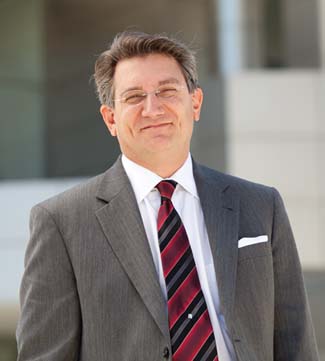 |
 |
| current issue |  | past issues |  | send a letter/news |  | address update |  | advertise |  | about us |  | alumni home |
Alumni Profiles
|
No Job Too Small A surgeon makes a difference in the lives of children By Sandra Hume '92 |
|
 David Zaitz |
In the era of "Nip/Tuck" and "Dr. 90210," southern California-based plastic surgeon Dr. Daniel Jaffurs '89 couldn't be blamed if he capitalized on Americans' obsession with surgical enhancement. But for Jaffurs, surgery isn't about improving the looks of adults; it's about improving kids' lives.
The only specialist in cranio-facial plastic surgery at the University of California at Irvine, Dr. Jaffurs primarily repairs cleft lips and cleft palates. These congenital defects strike an estimated 6,800 children in the United States each year. The complex surgery to correct them requires specific training and is neither straightforward nor a one-time procedure; after the initial surgery, rhinoplasty and jaw surgery are often required as the patient grows. Jaffurs and his "cleft team"—experts that include a geneticist, a social worker, a dentist, a speech pathologist and others—collectively oversee patients from infancy through age 21. "This is something that's going to affect a kid for the rest of his life," says Jaffurs. "You need to have a support system in place."
That's why when he takes overseas mission trips—he's been to Honduras and Colombia and us headed to Vietnam this fall—he only performs surgery when he's confident the local medical personnel can provide adequate follow-up care.
So he headed to the site of the reunion: Portsmouth, N.H. But when he realized his minimum-wage job at a drywall company made him one of the lucky ones--he could actually afford to eat—he figured it was time for a new career. He found himself at UNH at age 24, where his initial plan to become an EMT turned into an undergraduate degree in biochemistry. "I credit UNH for where I am now. It was the best education anyone could ask for," he says.
Thanks to a work-study job with zoology professor Charles "Chuck" Walker in his sophomore year, Jaffurs fell in love with research. His subsequent Ph.D. in molecular genetics and medical degree were more about credibility to earn NIH research grants than a desire to see patients. But all that changed the first time he stepped into an operating room. "I was home," he says. But the realization had a sobering component: "It meant five more years of school."
Those years would guide him to the work he loves so much today. After shadowing a surgeon who repaired cleft lips, he opted to train in pediatric cranio-facial surgery. "I found out I really liked taking care of kids."
That hasn't changed. Jaffurs does some facial reconstruction on adults, but for the most part, his patients are children. He likes it that way. "Kids are easy. They're a good gauge for what you've done. When they're not feeling good they're not feeling good, and when they're feeling better they just want to go play. And they heal really well." In addition to cleft-lip and palate surgery, Jaffurs also corrects other facial and skull issues, sometimes congenital, sometimes the result of trauma. "If it's on a kid and I can fix it, I will."
Although he appreciates the cards grateful parents continue to send him every year, his real gratification comes from the kids. "One 17-year-old girl I worked on had a lot of facial and head issues that no one had done anything about. She was shy and quiet and protected one side of her face, camouflaging it with her hair. But afterwards, she was a completely different person. She was more interactive, smiling more. She even changed her hairstyle."
Jaffurs contends that he's not going to get rich in this specialty. A good portion of his patient roster is uninsured, and their parents are often undocumented. But he remains content, with no plans to move to cosmetic surgery. "There isn't anything I'd rather do."
Easy to print version blog comments powered by Disqus

